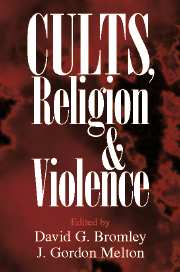Book contents
- Frontmatter
- Contents
- Acknowledgments
- Contributors
- Prologue
- 1 Violence and Religion in Perspective
- 2 Dramatic Denouements
- 3 Challenging Misconceptions about the New Religions–Violence Connection
- 4 Sources of Volatility in Religious Movements
- 5 Crises of Charismatic Legitimacy and Violent Behavior in New Religious Movements
- 6 Public Agency Involvement in Government–Religious Movement Confrontations
- 7 Watching for Violence: A Comparative Analysis of the Roles of Five Types of Cult-Watching Groups
- 8 Mass Suicide and the Branch Davidians
- 9 Occult Masters and the Temple of Doom: The Fiery End of the Solar Temple
- 10 Dramatic Confrontations: Aum Shinrikyô against the World
- 11 Making Sense of the Heaven's Gate Suicides
- 12 Lessons from the Past, Perspective for the Future
- Index
- References
11 - Making Sense of the Heaven's Gate Suicides
Published online by Cambridge University Press: 09 July 2009
- Frontmatter
- Contents
- Acknowledgments
- Contributors
- Prologue
- 1 Violence and Religion in Perspective
- 2 Dramatic Denouements
- 3 Challenging Misconceptions about the New Religions–Violence Connection
- 4 Sources of Volatility in Religious Movements
- 5 Crises of Charismatic Legitimacy and Violent Behavior in New Religious Movements
- 6 Public Agency Involvement in Government–Religious Movement Confrontations
- 7 Watching for Violence: A Comparative Analysis of the Roles of Five Types of Cult-Watching Groups
- 8 Mass Suicide and the Branch Davidians
- 9 Occult Masters and the Temple of Doom: The Fiery End of the Solar Temple
- 10 Dramatic Confrontations: Aum Shinrikyô against the World
- 11 Making Sense of the Heaven's Gate Suicides
- 12 Lessons from the Past, Perspective for the Future
- Index
- References
Summary
In March 1997, all thirty-nine members of a UFO cult known as Heaven's Gate committed mass suicide in an exclusive suburb of San Diego, California. Their leader, Do, believed a spacecraft was about to take them to the Kingdom of Heaven, where they would be reunited with his partner, Ti, who had died in 1985. To make the transition, Do claimed that he and his followers had to shed their bodies since the body was only a decaying container for the soul.
The suicides had been carefully planned. Two notes found by the sheriff's deputies spelled out the details – a mixture of barbiturates and alcohol to induce unconsciousness, followed by suffocation caused by a plastic bag placed over the head and secured at the neck with rubber bands. The bodies were dressed in black uniforms displaying colorful shoulder patches with the words “Heaven's Gate Away Team,” and each body had a travel bag next to it on the floor. The bodies were also neatly covered with purple shrouds. The evidence amassed by the sheriff's department and the medical examiner indicated that the suicides were undertaken voluntarily. No signs of struggle or violence were found, and the preparations included making two farewell videos in which the members appeared to be excited by the prospect of taking their lives.
The suicides were especially surprising because Ti and Do originally claimed that the only way to enter the Kingdom of Heaven was in a living physical body.
- Type
- Chapter
- Information
- Cults, Religion, and Violence , pp. 209 - 228Publisher: Cambridge University PressPrint publication year: 2002
References
- 4
- Cited by



